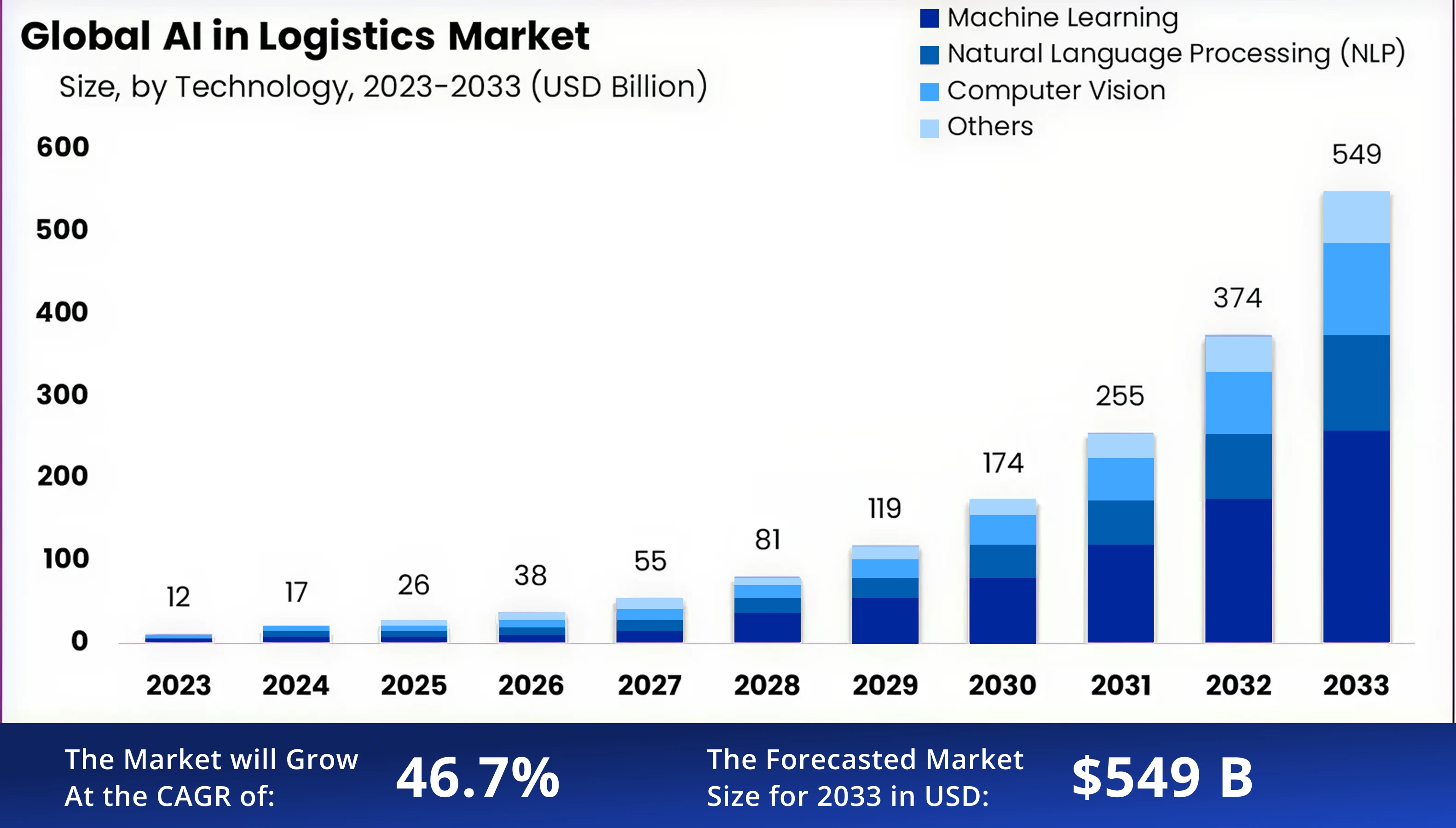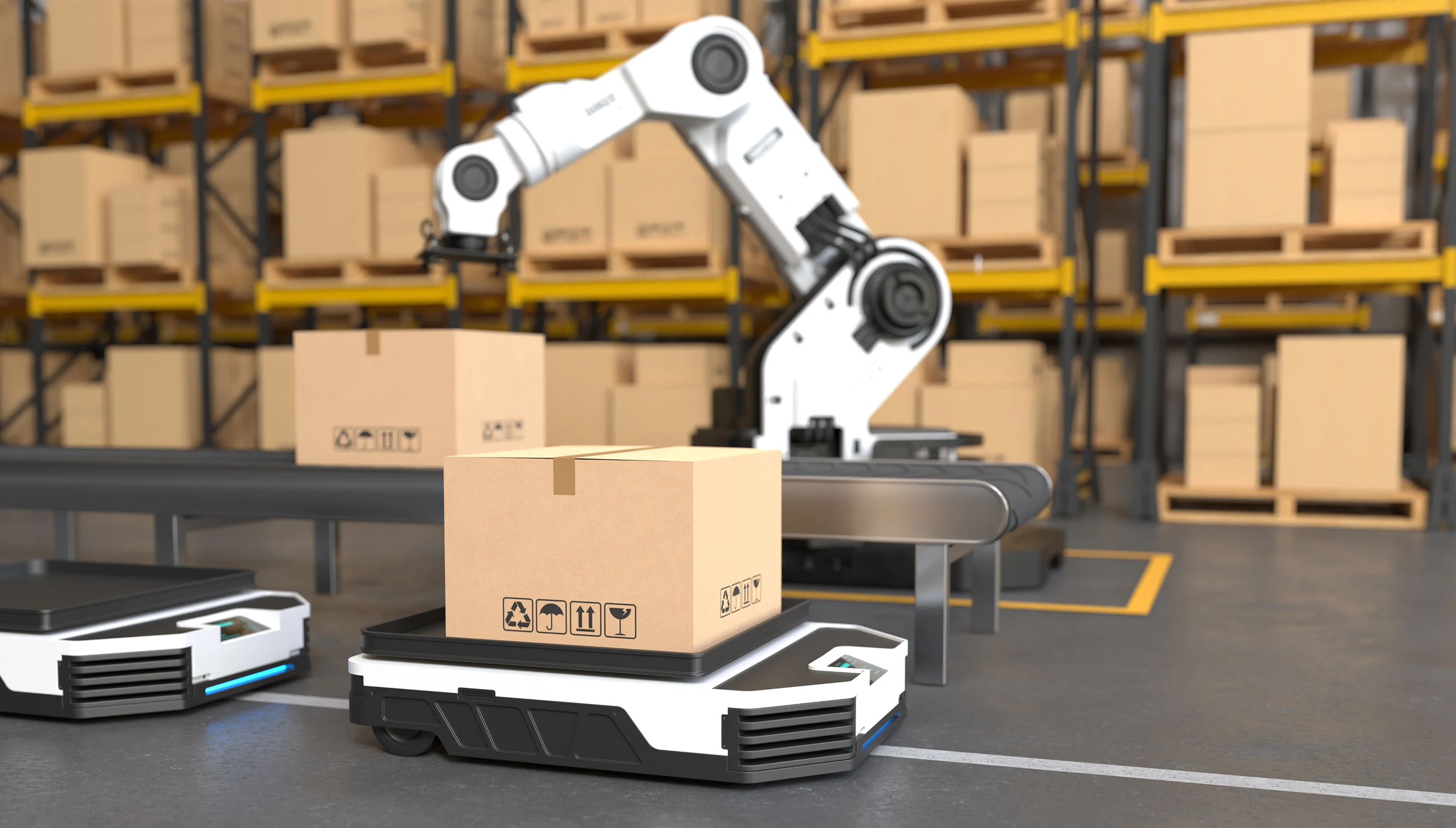AI/ML
AI in Logistics: How it is Revolutionizing the Logistics Industry
Written ByYash Vibhandik
CEO, Bitontree
Published:3 April 2025
20 minutes read

Globalization is breaking down challenges and limitations, allowing businesses to grow and flourish. Supply chain management and logistics are among the industries that have benefited and been impacted the most. To function effectively across boundaries, it must keep up with the rapid pace of technological advancement. The logistics sector, which makes a significant economic contribution and boosts bilateral trade, must be effective enough to transport products across borders quickly and easily.
AI has taken on such a significant role that it is now practically required in several businesses. According to Gartner, over the next five years, AI supply chain management companies are expected to see a twofold growth in machine automation in their supply chain operations. Building on the same ideas as AI and analytics, IoT in the supply chain has become a growing sector.
The entire logistics automation process, from obtaining raw materials to moving and distributing them, is included in the logistics sector. The incorporation of AI in logistics can significantly reduce operational expenses by increasing productivity and ensuring seamless operations. This article examines how artificial intelligence is transforming the logistics sector, the primary fields in which AI is having an effect, and the potential benefits and challenges associated with its implementation.
What is Artificial Intelligence in Logistics?
The term "artificial intelligence" describes a simulation of human intelligence in machines that have been designed to think and learn similarly to humans. AI in logistics involves technologies such as natural language processing (NLP), machine learning in logistics, and deep learning, all of which make it possible to automate several tasks and procedures. These technologies are capable of real-time decision-making, data-driven performance improvement, and large-scale dataset analysis.
AI in logistics streamlines key processes, including automated customer support, inventory control, route planning, and predictive analytics logistics. Logistics companies may increase operational effectiveness, reduce costs, and enhance customer satisfaction by implementing AI in different areas.
AI in Logistics Market Overview

Straits Research estimated the size of the worldwide AI and logistics market to be USD 12 billion in 2023. It is anticipated to expand at a CAGR of 45.93% to reach USD 549 billion by 2033.
The rapid growth of global trade and e-commerce is mostly driving the demand for AI in logistics. Logistics are essential to both e-commerce and international trade. The growth of IoT devices in the logistics sector is being facilitated by rising internet penetration and high-speed internet connections, which makes the application of AI easier.
According to a different McKinsey study, logistics companies will use AI to create between $1.3 and $2 trillion in economic value annually over the next 20 years.
Furthermore, according to Gartner, 50% of multinational corporations have spent money on real-time transportation visibility systems in 2023. Additionally, according to the American Transportation Research Institute, 82% of logistics and transportation companies anticipate that artificial intelligence (AI) and machine learning (ML) will play a significant role in their operations during the next three years.
How AI is Used in Logistics: The Use Cases
The use of artificial intelligence in logistics and supply chains has changed operations by automating regular tasks, optimizing routes, boosting security, lowering costs, and improving customer experiences. Several use cases of AI in logistics that you might find helpful are listed below.
Automated warehousing

Automated warehousing is a prime example of artificial intelligence in supply chain and logistics. AI-powered robots are taking over tasks like sorting and shuttling goods around the warehouse that humans formerly performed. This automation reduces errors and makes the best use of available space.
Furthermore, by predicting trends in the demand for goods, machine learning algorithms help with adjusting the warehouse's structure to meet future requirements. In addition to this, computer vision technology offers increased tracking precision, which is revolutionizing inventory management. Thus, the logistics industry's warehousing landscape is changing from a manual, labour-intensive operation to a highly advanced, efficient procedure because of artificial intelligence.
For example, Logiwa, a cloud fulfilment software pioneer based in Chicago, Illinois, enable large-scale direct-to-consumer businesses to grow and impress customers with flawless delivery. Logiwa uses AI in its inventory management and warehousing software to improve productivity, accuracy, and decision-making. Its AI algorithms prioritize incoming orders according to criteria such as urgency, shipment dates, and customer preference. They also estimate demand by analyzing previous sales data and industry trends.
Fleet Management

Planning the most effective transportation routes is one of the most logistical issues, particularly when large fleets are being managed. Route planning is improved by artificial intelligence (AI), which analyzes several data points, including weather, traffic patterns, fuel consumption, and delivery schedules. AI can streamline the routing process by using machine learning algorithms, helping businesses select the most rapid and inexpensive routes.
Logistics companies can respond quickly to unexpected issues like road closures or high traffic by using AI-powered solutions that dynamically modify routes based on real-time data. This enables businesses to boost delivery speed, minimize fuel consumption, and eliminate delays.
A logistics startup called FOURKITES uses artificial intelligence (AI) to follow fleet vehicles in real-time when they are on the road, at sea, and in the air. Shippers, carriers, and logistics service providers benefit from its visibility technology. The company manages over 3 million shipments daily across more than 6,000 data points and 18 million ETAs using Fin AI. This natural language interface automates time-consuming operations like estimating the downstream effects of supply chain problems.
Predictive Analytics
Logistics businesses can make more informed choices due to AI's ability to analyze vast amounts of data. One important use of AI in logistics is predictive analytics, which helps companies anticipate demand, project future trends, and identify potential supply chain disruptions. AI systems can forecast the demand for specific products by using consumer behaviour, market conditions, and previous data.
Inventory management is one area where predictive analytics is particularly helpful. It lowers the risk of stockouts and excess inventory by helping logistics organizations maintain a healthy inventory level without going overstocking. Companies that are able to predict demand can avoid excessive storage costs while maintaining customer expectations.
Coyote Logistics, which UPS acquired, use several techniques, such as artificial intelligence (AI), machine learning, and predictive analytics, to combine customer shipping data with external data (such as real-time traffic and weather) to assist shippers in anticipating supply-chain problems, such as delays, before they arise. They are, therefore, able to adjust their plans so that shipments still arrive on schedule.
Demand forecasting

AI is creatively revamping demand forecasting in logistics. AI uses predictive analytics to integrate a wide range of factors, such as weather patterns, regional events, and more, compared to traditional approaches that rely on historical data. As a result, future demand forecasts become incredibly accurate, which enhances supply chain management, prices, and customer happiness. Additionally, when AI gains knowledge from new data, its forecasting accuracy continues to improve, transforming logistics demand forecasting from guesswork to a data-driven science.
For example, H2O.ai encourages businesses to embrace AI, which simplifies supply chain and production tasks. H2O.ai uses artificial intelligence (AI) and a cloud platform to predict demand and returns, identify faulty machines, and predict when maintenance is required. To satisfy manufacturing and inventory requirements, the company also provides driverless AI vehicles to logistics companies.
Stock level optimization
Stock-level optimization in logistics, a historically difficult procedure prone to overstocks and stockouts, is being revolutionized by AI. However, this is changing as AI uses predictive analytics to maintain appropriate stock levels and make dynamic adjustments.
AI systems accurately predict future inventory requirements by analyzing a variety of data sources, including real-time demand and previous sales data. As a result, there are fewer instances of stockouts and excess inventory, which lowers expenses and raises customer satisfaction.
For example, manufacturers use C3 AI's AI-powered Inventory Optimization to control inventory levels in real-time for purchased parts, components, and finished goods. C3 AI's system continuously learns from data gathered from supplier deliveries, purchase orders, and manufacturing orders using advanced machine learning algorithms to generate stocking recommendations and more.
AI in Freight and Cargo Management
Another important area where AI is transforming logistics is freight management. Real-time cargo condition monitoring and management by AI-powered systems guarantees that sensitive goods, like pharmaceuticals or perishable goods, are delivered in the best possible conditions. Logistics businesses can take immediate measures to prevent damage to goods by using AI to detect potential problems like temperature variations or delays.
For example, using predictive analytics, HAVI provides a number of AI-based supply chain management and logistics solutions. Planning, optimization, sourcing, and data management are all included in the former. The latter includes distribution, warehousing, freight management, and procurement. Businesses may use this one-two punch to digitize their processes and build supply chains that are more robust and sustainable.
Benefits of Using AI in Logistics
Artificial intelligence is continuing to transform the logistics business by lightening up shipments. There are many benefits of using artificial intelligence in logistics. Every step of the logistics process may benefit from the application of AI. There are several ways AI can improve logistics operations, including:
Improved Efficiency and Productivity
The primary benefit of artificial intelligence in logistics will always be increased productivity and efficiency. Significant gains in productivity and efficiency can be achieved by streamlining procedures, automating repetitive tasks, and distributing resources optimally with the help of a well-integrated AI system.
Reduced Operational Costs
Reduction of operating costs is another significant benefit of AI in supply chain and logistics. By optimizing routes, decreasing fuel consumption, and reducing downtime through predictive maintenance, artificial intelligence lowers operational costs and boosts profitability.
Improved
Automated systems powered by artificial intelligence enhance worker safety and warehouse management. Manufacturers can use artificial intelligence to evaluate workplace safety data and alert them of possible hazards. Moreover, the system can update operations, record stocking parameters, and carry out necessary feedback loops and preventative maintenance. As a result, manufacturers can swiftly and effectively ensure warehouse safety and compliance.
Increased Customer Satisfaction
The ultimate purpose of any business is to satisfy its customers. AI is already being used by businesses to increase customer satisfaction through real-time tracking, delivery time estimation, and proactive problem-solving. Businesses may increase customer satisfaction with chatbots, which will lead to more return business.
Better Decision-Making
Logistics businesses have found that using AI-based automated solutions helps them make more accurate decisions. Supply chain executives can prepare for the future and make well-informed decisions with the help of AI-driven data.
The Challenges of Implementing AI in Logistics
Let us look at the various challenges associated with implementing AI in logistics:
-
Securing and Retaining the Right Talent
The intense competition for supply chain AI talent is a major challenge that demands for development of a workforce that can combine supply chain knowledge with AI experience. The ability of these experts to customize solutions to the particular dynamics of supply chain operations is essential for the successful deployment of AI.
-
Data Inaccessibility
Another significant challenge to AI in supply chains is data inaccessibility, which limits its capacity for learning and decision-making and results in less precise predictions and inefficiencies. As a result, making sure that relevant data is readily available has become vital for supply chain management AI integration and performance.
-
Functional Silos
AI systems are unable to obtain comprehensive information due to the silo problem, which occurs when teams communicate and operate independently. This makes it more difficult for AI to evaluate and optimize supply chains because successful analysis requires a wide range of integrated data.
-
Legacy Systems and Static Infrastructure
Outdated technology, which can be expensive and time-consuming to update and result in inefficiencies and decreased production, prevents the integration of AI in supply chain management. It takes substantial time, effort, and financial investment to upgrade these systems. Major issues include seamless AI integration, cost management, increased flexibility, and effective data management.
-
Diversity of Data Sources
Diverse data sources are essential to the application of artificial intelligence in supply chain management, which makes effective data processing and management a difficult task. Businesses need to implement a thorough plan for gathering and organizing a variety of data.
-
Lack of Clear Transformation Strategy
For supply chain management to effectively use AI, a clear plan is essential. A clear vision and strategy that emphasizes customer-centricity evaluates existing processes and creates an environment where employees are ready to adjust to technological advancements should be in line with the company's primary goals. This strategy may prevent lack of attention, resource waste, and lack of focus.
How Bitontree Can Help You Implement AI in Logistics?
By increasing productivity, cutting expenses, and facilitating better decision-making, artificial intelligence is revolutionizing the logistics sector. You may use strong AI solutions that are suited to your unique logistical requirements by collaborating with Bitontree. Our team of professionals will help you from conception to implementation, ensuring a smooth integration with your current systems, whether your goal is to automate tasks, optimize routes, or enhance inventory management.
Our proficiency in integrating Gen AI and AI will guarantee that your logistics platform is outfitted with the newest technology to improve your business processes. We provide end-to-end AI solutions for logistics companies of all sizes, ranging from sophisticated predictive analytics and automated procedures to intelligent route planning. Here’s how we can help you overcome various challenges associated with AI implementation in logistics:
- AI-Driven Process Optimization: Bitontree uses predictive analytics, artificial intelligence (AI), and machine learning algorithms to streamline production processes and minimize downtime.
- Real-Time Data Insights: To assist manufacturers in making data-driven decisions, we offer dynamic, real-time data analytics solutions that provide profound insights into production metrics, inventory levels, and supply chain performance.
- Cloud-Based Scalability: Because we are cloud-enabled, we can scale and adapt to the needs of expanding industrial businesses without sacrificing efficiency.
- AI-Powered Quality Control Systems: To find faults and guarantee superior manufacturing standards, we use AI-based image recognition and data analysis.
- Robust API Integrations: Bitontree provides a wide range of API integrations for connecting your production systems to external software, ensuring smooth departmental data transfer.
Conclusion
Artificial intelligence in logistics is revolutionizing the industry by increasing productivity, lowering costs, and improving the customer experience. AI is changing all aspects of logistics operations, from route optimization and warehouse automation to predictive analytics and customer support.
The logistics sector will continue to see notable gains in customer satisfaction, scalability, and performance as AI technologies advance. Businesses that use AI-driven solutions will not only maintain their competitive edge in the rapidly changing logistics market, but they will also lead new developments in the field.
For more information on how AI can improve your logistics processes and provide your business with a competitive advantage, get in touch with Bitontree right now! Together, we can streamline your logistics and produce exceptional outcomes.
Is Your Logistics Strategy Future-Ready? See How AI Can Help!
Frequently Asked Questions
AI optimizes supply chains by improving route planning, demand forecasting, warehouse automation, and real-time tracking, leading to cost savings and efficiency.
AI predicts customer demand trends, seasonal fluctuations, and inventory needs, ensuring optimal stock levels and reducing waste.
Yes, AI-powered dynamic route optimization and real-time traffic analysis help reduce delays and improve last-mile delivery efficiency.
Yes, AI minimizes fuel consumption, optimizes delivery routes, and reduces waste, making logistics operations more eco-friendly.



